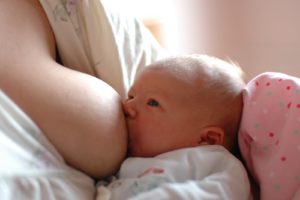 There has been much discussion recently about breastfeeding - why is it so important? Is it really better than formula? The answer is: YES, breastfeeding is the BEST food for the baby, and for a number of reasons. Not only is it nature's perfect food for the baby, but it also helps the development of the baby's microbiome or microbiota (the community of microbes that live within and on humans).
There has been much discussion recently about breastfeeding - why is it so important? Is it really better than formula? The answer is: YES, breastfeeding is the BEST food for the baby, and for a number of reasons. Not only is it nature's perfect food for the baby, but it also helps the development of the baby's microbiome or microbiota (the community of microbes that live within and on humans).
Specifically, breast milk transmits about 700 species of bacteria to the baby - bacteria that are important in developing the baby's microbiota, bacteria that are important for the baby's development and health in many ways (including the immune system). No formula does that. Not even close.
There is obviously much we don't know or understand yet, but finding 700 species in breast milk is a big deal. The most variety was in colostrum (the first milk), but even after 6 months (mature milk) they found hundreds of species of bacteria. What was also interesting was that the bacteria species in the breast milk varied whether the baby was born by vaginal birth, unplanned cesarean, or planned cesarean (this last had a somewhat different bacterial community which persisted through the 6 months of the study).
By the way, in the original study, the authors made a point of saying that the 700 bacteria species are NOT bacterial contaminants, but meant to be there! (for those who want to sterilize and pasteurize everything because they think that all bacteria are bad).
This study is from 2013, but well worth reading. From Science Daily: Breast milk contains more than 700 species of bacteria, Spanish researchers find
Researchers have traced the bacterial microbiota map in breast milk and identified the species of microbes taken from breast milk by infants. The study has revealed a larger microbial diversity than originally thought: more than 700 species. The breast milk received from the mother is one of the factors determining how the bacterial flora will develop in the newborn baby.
A group of Spanish scientists have now used a technique based on massive DNA sequencing to identify the set of bacteria contained within breast milk called microbiome. Colostrum is the first secretion of the mammary glands after giving birth. In some of the samples taken of this liquid, more than 700 species of these microorganisms were found, which is more than originally expected by experts.
"This is one of the first studies to document such diversity using the pyrosequencing technique (a large scale DNA sequencing determination technique) on colostrum samples on the one hand, and breast milk on the other, the latter being collected after one and six months of breastfeeding," explain the coauthors, María Carmen Collado, researcher at the Institute of Agrochemistry and Food Technology (IATA-CSIC) and Alex Mira, researcher at the Higher Public Health Research Centre (CSISP-GVA).
The most common bacterial genera in the colostrum samples were Weissella, Leuconostoc, Staphylococcus, Streptococcus and Lactococcus. In the fluid developed between the first and sixth month of breastfeeding, bacteria typical of the oral cavity were observed, such as Veillonella, Leptotrichia and Prevotella....The study also reveals that the milk of overweight mothers or those who put on more weight than recommended during pregnancy contains a lesser diversity of species.
The type of labour also affects the microbiome within the breast milk: that of mothers who underwent a planned caesarean is different and not as rich in microorganisms as that of mothers who had a vaginal birth. However, when the caesarean is unplanned (intrapartum), milk composition is very similar to that of mothers who have a vaginal birth.
These results suggest that the hormonal state of the mother at the time of labour also plays a role: "The lack of signals of physiological stress, as well as hormonal signals specific to labour, could influence the microbial composition and diversity of breast milk," state the authors.
And yes, what you eat while breastfeeding has an effect on the breast milk. From Science Daily: Carotenoid levels in breast milk vary by country, diet
A Purdue University-led analysis of breast milk concludes that levels of health-promoting compounds known as carotenoids differ by country, with the U.S. lagging behind China and Mexico, a reflection of regional dietary habits. Carotenoids are plant pigments that potentially play functional roles in human development and are key sources of vitamin A, an essential component of eye health and the immune system.
The carotenoid content of a woman's breast milk is determined by her consumption of fruits and vegetables such as squash, citrus, sweet potatoes and dark, leafy greens.
